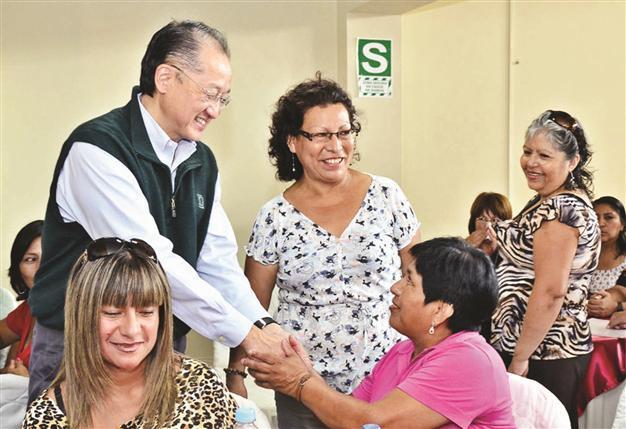Yong Kim chosen for World Bank presidency but not unanimous
WASHINGTON - The Associated Press

Kim (L) is seen greeting a woman during a visit to in Lima, Peru, on April 15. AP photo
Jim Yong Kim, the American chair of Dartmouth College, has been chosen to be the next president of the World Bank. His selection on April 11 extends the U.S. hold on the top job at the 187-nation development agency.Kim, a surprise nominee of President Barack Obama, was selected on April 16 evening in a vote by the World Bank’s 25-member executive board. The agency did not provide information on the final vote other than to say “the final nominees received support from different member countries” indicating that Kim’s selection was not unanimous.
Kim will succeed Robert Zoellick, who’s stepping down after a five year term.
Developing nations waged an unsuccessful challenge to Kim, a physician and pioneer in treating HIV/AIDS and tuberculosis in the developing world.
Kim issued a statement accepting the job from Lima, Peru, his last stop on a global tour that took him to Africa, Asia and Latin American, seeking support from developing countries.
He praised his two opponents from developing countries and said his goal as president would be to “seek a new alignment of the World Bank with a rapidly changing world.” Kim’s selection marks a break from previous World Bank leaders who were typically political, legal or economic figures. The World Bank raises money from its member nations and borrows from investors to provide low-cost loans to developing countries.
Treasury Secretary Timothy Geithner praised the selection, saying Kim “has a lifetime of experience solving complex problems.” He said Kim “will help breathe new life into the World Bank’s efforts” to promote economic growth around the world.
Developing countries had put forward two candidates for the post -Nigerian Finance Minister Ngozi Okonjo-Iweala and former Colombian Finance Minister Jose Antonio Ocampo. Both had argued that it was time to break the hold the United States has had on the World Bank job and provide a greater voice for developing nations.
















